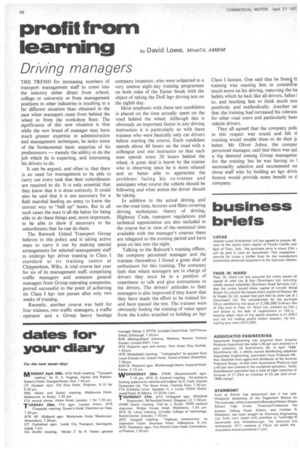profit from
Page 66

If you've noticed an error in this article please click here to report it so we can fix it.
learning by David Lowe, MInstTA, AMBIM
Driving managers
THE TREND for increasing numbers of transport management staff to come into the industry either direct from school, college or university or from management positions in other industries is resulting in a far different situation than obtained in the past when managers came from behind the wheel or from the workshop floor. The significance of this new situation is that while the new breed of manager may have much greater expertise in administration and management techniques, he lacks some of the fundamental basic expertise of his predecessors — namely the ability to do the job which he is expecting, and instructing his drivers to do.
It can be argued, and often is, that there is no need for management to be able to carry out every task that their subordinates are required to do. It is only essential that they know that it is done correctly. It could also be said that it is not necessary for a field marshal leading an army to know the correct way to "bull up" boots. But in all such cases the man is all the better for being able to do these things and, more important, to be able to show if necessary to his subordinates that he can do them.
The Bulwark United Transport Group believes in this policy and is taking active steps to carry it out by making special arrangements for selected management staff to undergo hgv driver training to Class I standard at its training centre at Chippenham, Wilts. A trial course last year for six of its management staff, comprising traffic managers and assistant general managers from Group operating companies, proved successful to the point of achieving six Class I hgv test passes after only two weeks of training.
Recently, another course was held for four trainees, two traffic managers, a traffic operator and a Group heavy haulage company inspector, who were subjected to a very intense eight-day training programme on both sides of the Easter break with the object of taking the DoE hgv driving test on the eighth day.
Most emphasis with these test candidates is placed on the time actually spent on the road behind the wheel. Although this is obviously an important factor in any driving instruction it is particularly so with these trainees who were basically only car drivers before starting the course. Each candidate spends about 40 hours on the road with a colleague and one instructor so that each man spends some 20 hours behind the wheel. A great deal is learnt by the trainee who is observing since he is more relaxed and so better able to appreciate the problems facing his co-trainee and anticipate what course the vehicle should be following and what action the driver should be taking.
In addition to the actual driving and on-the-road time, lectures and films covering driving techniques, theory of driving, Highway Code, transport regulations and technical appreciation are also included in the course but in view of the restricted time available with the manager's courses these are relegated to the evening period and have gone on late into the night.
Talking to the Bulwark's training officer, the company personnel manager and the trainees themselves I found a great deal of enthusiasm for this training. The company feels that where managers are in charge of drivers they must be in a position of experience to talk and give instructions to the drivers. The drivers' attitudes to their Managers is also improved if they know that they have made the effort to be trained for and have passed the test. The trainees were obviously finding the training of value apart from the kudos attached to holding an hgv Class I licence. One said that he fount ft training was causing him to concentrai much more on his driving, removing the ha habits which he had, like all drivers, fallen i to, and teaching him to think much ram positively and methodically. Another sai that the training had increased his tolerant for other road users and particularly hem. vehicle drivers.
They all agreed that the company polit in this respect was sound and felt ti training would enable them to do their jr better. Mr Oliver Johns, the compar personnel Manager, said that there was qui a big demand among Group manageme for the training but he was having to I necessarily selective and recommend on those staff who by holding an hgv drivii licence would provide some benefit to ti company.












































































































